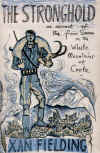History Box Nr. 3

Well, more of a 'literary box' really.
Two of the
great
books about Crete, were written by
Xan Fielding. Both are out of print,
sadly! The first, "
Hide and Seek", concerns Fielding's amazing
wartime exploits, and is a wonderful read. The second, published in 1953, concerns his
subsequent visit to Crete and is called "
The Stronghold: An account of the
four seasons in the White Mountains of Crete"
(If
you get the opportunity to buy one of these, grab it, with any luck it will come with the
dust-jacket - opposite - from a painting by John Craxton).
It's a fabulous book, full of anecdotes and
salient observations, and I'd like to quote from a passage, from the chapter on
Koustoyerako, which lies a few kilometres North-East of Soughia. The following extract, is
on the - thankfully - outlawed practice of the "dowry" system, wherein daughters
were married-off to suitors, with promises that she'd come with a plot of land, and/or
other financial incentives. I have placed this anecdote here, as an antidote for the sheer
misery that is the walk, below this piece:
'...a girl whose other sisters have already
married, or whose parents owned little or no land in the first place, has very little
chance of finding a husband, however great her personal charms. And so she relies on other
charms. I am not sure if love potions are still widely used in Crete, but I discovered
existing recipes for two of them, which show to what lengths a girl will go in order to
get her man.
'The First, known as "mothers milk",
requires ingredients, which certainly cannot be available in a small mountain village.
Moreover, four female accomplices are needed for the preparation of the potion - two woman
with the same Christian name, and two others who must be a mother and her married
daughter. Such a quartet, would not be hard to find, but the recipe lays down an
additional condition: the mother and the daughter must each have an unweaned child. They
are made to sit down, back to back and facing east and west respectively, and are then
milked simultaneously by the two women of the same name. The milk extracted is given to
the would-be bride, who mixes it with water and whispers: "As a mother loves a child,
so may (and here she names the youth of her choice) love me" The liquid is finally
used to make bread, which is offered to the youth at the earliest opportunity. After
eating it - but how long afterwards, nobody knows - the youth is inflamed with an
uncontrollable passion for the girl, which makes him blind to the poverty of her parents
and deaf to the counsel of his own.
'The second potion, which is said to be equally
effective, is simpler to prepare. Only the basic ingredients of elementary sorcery are
needed: nail-parings and hair - and these do not even have to come from the victim; the
young girl uses her own. She plucks one hair from her right temple, to which she adds a
bit of her left thumb-nail; then - and the order is important, one hair from her left
temple and a bit of her right thumb-nail. This mixture is enriched by the addition of one
hair from her right arm-pit, followed by a bit of nail from the big toe of her left foot;
and one hair from her left armpit with a bit of hair from the big toe of her right foot.
These precious odds and ends are then set on fire, and while they burn, the girl utters
her spell: "May I shine in his eyes like the sun, may I beam on him like the
moon." The ashes are finally collected and set aside until an opportunity occurs for
them to be put in a cup of coffee, which is promptly offered to the unsuspecting suitor.
'No wonder mothers here warn their unmarried sons
against accepting food and drink from the hands of a virgin!'
Xan Fielding; "The Stronghold: An
account of the four seasons in the White Mountains of Crete." Pages 25-26. First
published by Secker and Warburg, London 1953.
Wonderful stuff!

